
Vol. 1, No. 34 Published by India China Division, Air Transport Command September 6, 1945

Hq., Calcutta - The end of ICD's job is in sight and the time of waiting to go home not too long,Brig. Gen. Tunner announced this week in a statement to the command. In line with his policy of "sharing promptly with personnel" all official information possible upon termination of the command's responsibilities following the end of the war, Gen. Tunner said: "The policy of this command will be to close down our Hump operation as soon as possible and to send our personnel home as fast as work loadand transportation permit." 'Steady Close-out' ICD's tonnage commitments to Americans serving in the China Theater have been established for the immediate future as follows: 1. In September, ICD will be required to airlift only approximately 70 percent of July's total tonnage. 2. In October, Hump tonnage requirements to supply American forces in China are expected to drop to as little as 40 percentof the July total, although all factors permitting such a drop are not yet "firm." 3. In November a more marked reduction from July's tonnage may be expected and after November the Hump operation is expectedto close out steadily.ICD supporting missions in India and China will close with it. (The above modification of Gen. Tunner's statement was the result of developments occurring since the statement was deliveredto the field earlier this week.) The Hump, for the time being, is the only means of supplying Americans still serving in China, but will be operated upon a sharplydiminishing tonnage basis, terminating as soon as possible after November's requirements are met. "It will be clear to everyone why China must have Hump tonnage for another two months," the general said."There are thousands of American soldiers still in China who have work to do.Scattered through the vast areas of China are hundreds of thousands of Japanese troops.In connection with the surrender of these armies, American forces have many responsibilities - duties which cannot be discharged by any existingmeans of land transportation, but must be discharged by air," Gen. Tunner said.He pointed out the consequent demand for U.S. air transport and the necessity for transporting gasoline, adding: "Even if Americans did not have this job to finish in China, they could not be evacuated immediately because it is impossibleto move that many people that fast - especially in China.More important, they cannot receive their essential sustenance and other supplies from China ports at this time.These ports, which have not even been opened yet, cannot be placed in full operation overnight.We therefore have a job which must be done efficiently, as speedily as possible and safely.But the end is in sight and the time of waiting not too long." It was pointed out that ICD's sharply reduced tonnage commitments beginning with September will make possible a far saferoperation, less pressure upon personnel and, above all, an immediate beginning to the all-important business of releasing people to go home. An orderly program, consistent with War Department directives, for handling the release of men to go home will be placedinto effect immediately, Gen. Tunner announced. "It will be welcome information to all concerned that the boat and plane space available to the United States from Indiawill be in excess of the estimates first received by ICD," he said. 1345 BU GI Saves Two From Drowning, Gets Commendation 1345 BU, Kurmitola, India - Prompt action by Pfc. Myron J. Foreman, Brooklyn, N.Y., aerial radio operator here,was credited with saving two GIs from drowning recently and has earned Foreman a commendation from Maj. James M. Kempner, CO of the1351 Jungle Indoctrination camp. While on leave at rest camp Foreman volunteered as relief lifeguard.He was on duty when Pfc. Edward L. Brady, 1345 BU, was submerged by waves and rendered helpless by the heavy current.His companion, Sgt. Matthew A. Martino, also of 1345 BU, effected a rescue but was grasped by the drowning man and in danger of goingunder himself. Foreman went to their rescue, separated the two struggling men and succeeded in getting Brady to shore.Martino was able to swim in unassisted. |
Get New Lease on Life as ICD Aircraft Carry Them to Calcutta Hospital for Return to Home and Liberty
By S/Sgt. Floyd E. Matteson
Rangoon, Burma - Out of the prisoner-of-war camps in the jungles of Thailand they come - freedom-loving Americans - after three and one-half years as prisoners of the Japanese.
Doctors, flight nurses, medical technicians and flight crews from various branches of the air forces rushed into action after waiting here impatiently for weeks for the "go ahead"signal allowing them to enter Thailand and bring out the prisoners.
Hardly had Lt. Gen. Numata, chief of staff to Count Terauchi, the Jap commander of the armies of southeast Asia, signed his name to the surrender documents in Rangoon,Aug. 28, before C-47's of the Combat Cargo groups settled on the runways of Japanese airfields in Thailand to pick up American, Australian, British and Dutch prisoners to take themto Rangoon and freedom.
ICD Detachment
A detachment of operations and P&T personnel from 1305 BU, Dum Dum, has been stationed at Rangoon to facilitate transportationof POWs to Calcutta.Capt. H. W. Bonnell, operations officer;Capt. John Wyatt, P & T;S/Sgt. A. L. Shuaert, S/Sgt. Ray Saumell and Sgt. James Brandon are some of the ICD men in Rangoon.
Capt. Edward M. Coe, of the 803 Air Evacuation squadron at Chabua, is also in Rangoon, in charge of the evacuation from thereto Calcutta.There are a number of ICD medical technicians who have been flying into Thailand after the prisoners, and ICD technicians and flight nursesaccompany the POWs from Rangoon to Calcutta.
In Rangoon the Americans were given a meal - spam sandwiches, which they ate with relish; white bread and coffee, over whichthey raved - and were put aboard ICD planes which flew them to Calcutta.
Crew members of the first ship to arrive at Patta Bura airdrome, about 45 miles from Bangkok, were greeted with cries of, "We've been waiting for you, Yank!" with handclasps, tears, cheers and almost with hugs and kisses.
Americans First
This crew, which landed while the former Jap commander of the field and his aides stood silently by, were 1st Lt. J. A. Weiner, pilot;2nd Lt. R. E. Feinstein, co-pilot;Sgt. V. L. Lucarelli, engineer,and Cpl. Robert E. Bagnal, radio operator, all of the Second Air Commando group,and Pfc. Robert L. Washington, medical technician, of 1305 BU, Dum Dum.
The first prisoners to be evacuated were Americans, all able to walk.Many, however, had tropical ulcers, not yet healed.Most of them had scars and bruises as souvenirs of their stay in the Jap camps.
The other Allied prisoners who arrived here on American planes, many of them litter patients, were turned over to the British authorities.
Texas Outfit
The men all appeared to be in good spirits though they still felt like they were dreaming and expected a Jap guard to step infront of them at any moment.
Most of the returned prisoners were Texans - men who were on the cruiser "Houston," when it went down at midnight, Feb. 28, 1942, andmen who were in the 131st Field Artillery, a Texas outfit captured at Java, March 8, 1942.
Most of the officers over the rank of lieutenant colonel were sent to Japan.The other officers and men were taken to Singapore and imprisoned with the thousands of British, Dutch and Australian prisoners there.
In January 1943, they were shipped to Moulmein, Burma, and put to work building the Moulmein-Bangkok railroad.They were sure they would be rescued during the first three months in Burma but even though the three months passed, they never gave up hope.Night after night, as they returned to their camps from the back-breaking work, they prayed."Oh, if the Yanks would only come tomorrow."
All ranks had to salute the Japanese and the Korean guards.For a while they were forced to bow to Jap officers.Their food was poor rice and stew supplemented with what they could purchase from the natives and with a boiled "jungle weed" which tasted like spinach and fromwhich they obtained the vitamins that kept them alive.
There was no recreation nor entertainment of any kind.Sometimes they worked for 90 days without a day of rest.Often they worked 12 to 14 hours a day.
If men had a fever of 106, they were allowed to stay in the hospital, but food rations were cut in half for those who couldnot work.Officers who received a part of their pay, which was the same as that received by an officer of the same rank in the Jap army, turned their money overto the hospital to buy food for the patients.
The officers were separated from the enlisted men in February, 1945.In the officers' camp they kept a radio which told them how the war was going.The other camps heard about the surrender from the Thailanders on Aug. 16, but thought it was only a rumor until work parties came in at 10 a.m. - a hitherto unheard-of happening.On Aug. 17 the Jap camp commanders announced the end of the war.
Guards from the ranks of the prisoners were immediately put on duty to keep order.The Japs issued Red Cross packages dated 1942, gave out more food and some clothing.After Gen. Numata completed negotiations in Rangoon, the Japs started bringing prisoners from outlying jungle camps to various airdromeswhere they were picked up by American and British planes.
ICD planes will have flown some 500 ex-POWs to Calcutta by the end of the week.The men will stay at the 142nd General Hospital until their condition permits travel to the States.Most of them will go home by ATC planes.
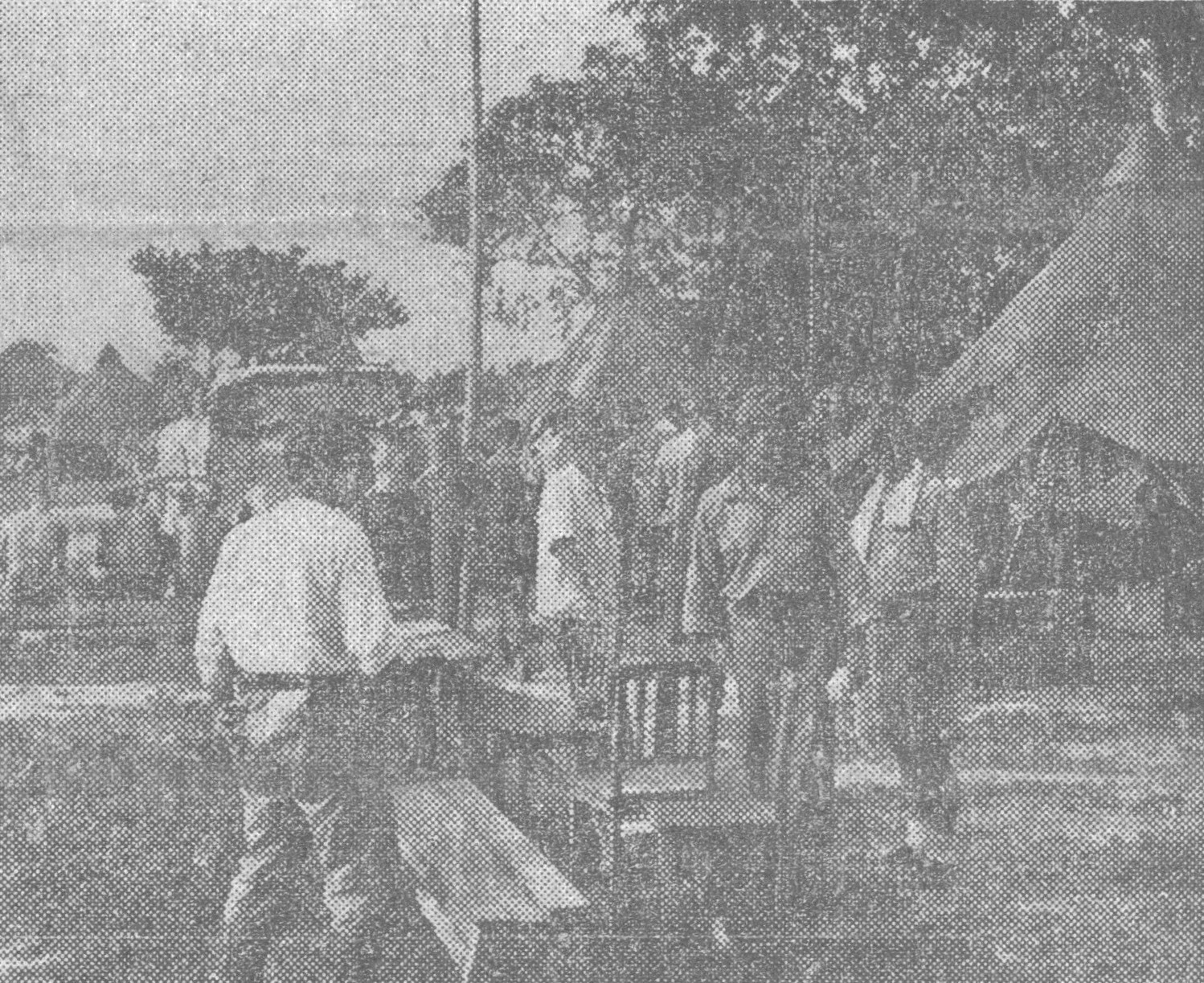 Patta Bura Airdrome, Thailand - An ICD photographer snaps the former Jap commander of this base (second from right) as he and his aides watch the release of the Yank POWs.The airdrome was built by Allied POWs. (Photo by S/Sgt. Wesley Ramsey.) Patta Bura Airdrome, Thailand - An ICD photographer snaps the former Jap commander of this base (second from right) as he and his aides watch the release of the Yank POWs.The airdrome was built by Allied POWs. (Photo by S/Sgt. Wesley Ramsey.) |
2,500 Command Personnel
To Be Processed for Home
Hq., Calcutta - Immediate processing of approximately 2,500 of the command's personnel for return to the States wasannounced today by Brig. Gen. Tunner.
Col. James I. Teague, assistant chief of staff for personnel, announced that this first homeward-bound contingent will fall into thefollowing general categories:
1. Enlisted men with 85 or more points.
2. Enlisted men 38 years of age and over.
3. Men who have been in the division the longest who are now classified as "redeployment" troops and who will return to theStates for reassignment for further service.
750 85-Pointers
Plans for separation of officers eligible under WD readjustment categories will be announced as soon as possible, Col. Teague said.
The A-1 director pointed out there are approximately 750 enlisted men with 85 or more points.Of those, more than one third are radio operators who, because of the essentiality to the command at this time, cannot be released untilreplacements are available, but who will be released "the instant it is possible to do so," he said.
1,040 on Re-Deployment
There are approximately the same number of enlisted men in the division who are 38 years old, A-1 files reveal.Those men who apply for discharge and who are released by their respective stations (which may hold them for a maximum of 90 days after they apply, if military exigency demands) will not be held by the division, Col. Teague said, but will move out as rapidly as possible.
Approximately 1,000 enlisted men and 40 officers are in the classification of "re-deployment" troops who have served thelongest in the division, he said.
Orders will be cut on the 2,500 men as quickly as other details necessary to returning that number of men home can be handled.
Chaplain's Book Depicts Hump Bailout, Jungle Trek
Capt. Harry F. Wade, chaplain at 1305 BU, Dum Dum, has achieved an ambition to which many army men aspire but which few accomplish.He's written a book!
The volume, 60 pages in length, telling the story of his experiences as a chaplain in Assam and chroniciling his walk out ofthe Burma jungles after parachuting from a plane over the Hump, is dedicated to 1st Lt. John Dietzel, survivor of the same bailout, who laterlost his life.
Nothing Beyond
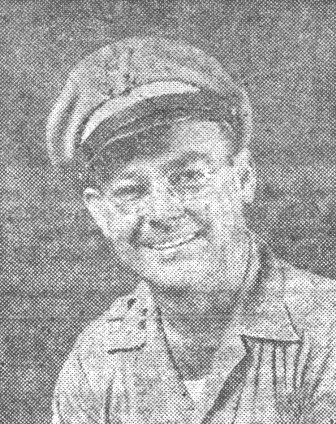 |
Meat of the book, which has sold 10,000 copies and now is in its second printing, is the chaplain's description of his tedioustrek out of the jungles after his bailout at 22,000 feet - "five miles closer to heaven than I've ever been."
Crew members on the flight, which Chaplain Wade made to familiarize himself with what crews go through on Hump hops,included Lt. Robert Seimoneit, Lt. Dietzel, Sgt. Pete Carlin and Pvt. Perry Raybuck.
The "Padre" described one of his closest brushes with serious injury while following cascades down the mountain, trying to reach a river valley.
He wormed his way around a four-inch-wide ledge, and felt he could make it to a lower ledge if a jutting rock about two feetaway would hold his weight.It was loose and fell.His feet slipped on the wet ledge below and he went hurtling through space, landing on the rocks below.
High Tribute
Although dazed, he was not seriously hurt.After four days of painful, tiresome walking and crawling, the chaplain came to a stream where he established "Fort Wade,"fashioning his "home" of bamboo, weeds and ferns, covering it with elephant leaves and grass.
He was sighted by an L-5 rescue pilot, Lt. Charles Linn, at the end of his fifth day, and brought out a couple of dayslater by a ground rescue party, with the assistance of hill people.Lt. Seimoneit made his escape in three days, Lt. Dietzel and Pvt. Raybuck met and walked out in 16 days, while it took Sgt. Carlin 39.He spent many of them hacking his way through the jungle in search of the others.
The writer pays high tribute to the fliers making the Hump run, asserting, "To these lads every American must doff his hat..."
GI's Girl Friend Composes Missive That Tops 'em All
1338 BU, China - When Cpl. Dominick Magro, Allendale, N.J., asks, "Don't you wish you had a girl like mine?" no onehas a comeback to make. Most GIs see his point.
Cpl. Magro was amazed recently at the size of a letter handed him at mail call.When he slit the envelope, he and interested bystanders fairly ogled at its contents - a 92-foot-by-14-inch missive from his fiance backin Uncle Sugar!
By reading six feet of the testimonial each weekday and eight feet on Sundays, the Allendale GI figured he could, in a little over twoweeks, discover just what was on the young lady's mind.Each evening he settled down with his scroll, while less-lucky GIs enviously looked on, for a period of self-allotted pleasure-reading.
Cpl. Magro sighed happily when he finished the masterpiece.Curious GIs still are wondering what the lady had to say.
MPs Chase Bandits, Slay One, in Foray at Base at Chanyi
SOS Base, Chanyi - One bandit was killed and several others driven away by Chinese and American military police, duringan attempted burglary of a U.S. quartermaster warehouse here recently.
Pfc. Thomas P. Lydick, on duty at a transportation warehouse stated he was notified by Chinese soldiers, on duty at a sentrybox, that a group of unidentified men were prowling in the neighborhood.
At the same time Pvt. Frank J. Bevans and Pfc. Frederick C. Smith, both on guard duty, were joined by a group of Chinese MPs.The party immediately went to the warehouse, where they surprised the bandits and were fired on.
When Bevans and Smith were pinned to the ground by the bandits' fire, the Chinese guards took cover and returned the fire.The following morning the body of a civilian, one of the bandits, was discovered near the warehouse.
Maj. M. E. Magnuson, Helena, Mont., S-2, in commenting on the co-operation of Chinese authorities in controlling lawless elements in this area, credited the Chinese guards with saving the lives of the American GIs on duty.
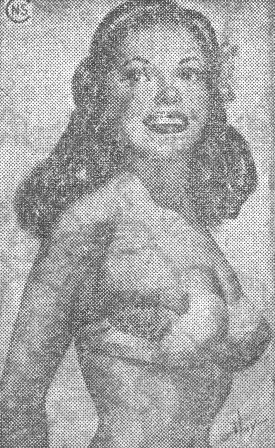 This sketch of "Mona," famed pin-up gal of the Antilles, graces the noses of six planes in that department, including that used byV/Adm. Robert C. Griffin, commandant of the Tenth Naval District. This sketch of "Mona," famed pin-up gal of the Antilles, graces the noses of six planes in that department, including that used byV/Adm. Robert C. Griffin, commandant of the Tenth Naval District. |
New Procedures Initiated To Increase Air Safety
Hq., Calcutta - To insure the greatest possible flying safety, changes in operating procedures are being instituted, including reduction of night takeoff loads, according to a letter just sent to the field.
Pointing out the new measures are for greater safety and yet are "commensurate with the accomplishment of the assigned mission," the letter puts an ended to loaded night takeoffs of C-87s, B-24s and C-109s.Gross takeoff weights from India will be 58,000 pounds for 87s and 109s and 60,000 pounds for B-24s.
C-46 Restricted
C-54s, considered ICD's safest airplanes, will be used for day and night flights.Loads at takeoff in India will range from 68,000 to 70,000 pounds, depending upon type of engines used.Somewhat smaller loads will be permitted in lifts from the Yunnan plateau in China.
Maximum takeoff weights for C-46s will be 47,000 pounds day or night, and passenger flights will be restricted to daylight only.Present utilization of C-47s will be continued.
Rest for Crews
In-flight and terminal weather briefing and closer air traffic control with 15-minute separations between Hump flights at thesame altitude over the same route, also are expected to increase the safety factor.
All crews are required by the letter to have at least 12 hours' rest between flights.After flights of more than ten hours round-trip flying time, crews will be given 24 hours of rest before being called upon to take off again.
Thousand DFCs Being Distributed to ICD Bases
Hq., Calcutta - Approximately 1,000 Distinguished Flying Crosses are being sent to bases throughout ICD,to men who previously had received orders and ribbon bars but no medals.
The mass distribution marks the shipment of the first DFC medal in this theater since March, according to thedecorations, commendations and insignia section here.
There has been no holdup on supply of other medals the section stated.
Tiger Gets Beat in Race For Cannibalistic Dinner
1326 BU, Lalmanir Hat, India - In a three-party race here recently, the men claim it wasn't necessarily the best man -but the most frightened one - who won.
Down the homestretch, pounding the ground on the road to the officers' club, came a strange procession.Running almost neck-and-neck were Capt. W. B. Billmire, director of S & S, his Indian driver and a large, fierce-looking striped quadruped.
The driver entered the club a split second ahead of the officer, and the Bengal tiger didn't even make it over the finish line.
This was only one of a series of GI-tiger incidents which have taken place at this base.Capt. John C. Oliver, malaria control officer, dispatch a full-grown male tiger on the outskirts of the base, and a cub was struck and killed on the
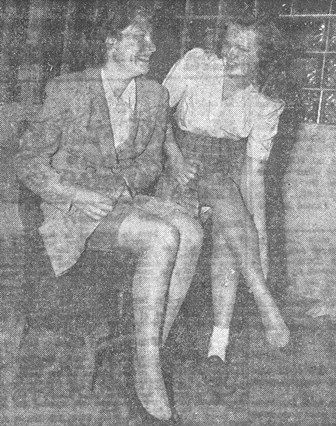 These smiling gals - among the crowd of women which stormed a hosiery mill at San Leandro, Calif. - were lucky enough to get two of12,000 pairs of prewar nylons which were on sale.The women are Elaine Jorgensen (left) and Mrs. Elisabeth Warkentien. These smiling gals - among the crowd of women which stormed a hosiery mill at San Leandro, Calif. - were lucky enough to get two of12,000 pairs of prewar nylons which were on sale.The women are Elaine Jorgensen (left) and Mrs. Elisabeth Warkentien. |
A crew on the wash rack, surprised by a tiger strolling along smacking its jaws one evening, promptly boarded the plane they were servicingand locked the door.That same night Capt. Francis W. McCoy, flight surgeon, romped into his quarters about a yard ahead of a cat described as "slightly smaller than a water buffalo."
MPs reported a big cat hanging around in the vicinity of the post theater, but opined that the scent of an Olsen and Johnson picture made it keep its distance.
Gals Send Letters By Hundreds After Appeal to 'Tribune'
1351 BU, Kurmitola, India - It's a long jump from being a "lonesome darling" to a "GI with SA," but four GIs have made it -and have 300 letters from Stateside cuties, erstwhile strangers, to prove it!
Pfc. Albert J. Johnson, Cpl. James Lavis, S/Sgt. Herb E. Lawrence and T/Sgt. Edwin D. Isaacs were once lonely and unhappy because they never got any letters from home.In fact, one night at the EM club they became so depressed that they began crying - into their beer - about the lack of mail.
Having all been residents of Tulsa, Okla., at one time, the men decided to tell the "Tulsa Tribune" their troubles.So Pfc. Johnson and Cpl. Lavis composed and mailed the beer-scented missive that very night, and all four forgot about it the next day.
Then the GIs got a letter, "I am a buxom lass of 50," the writer stated.She added that she wrote to 264 servicemen every month, and was very happy to put them on her list.After that the mail literally poured in - over 300 letters in one week, all from females, ranging in age from 16 to 64.
A young girl of 16 is in love with all four of "you lonesome darlings," and a 29-year-old woman has promised to sendthe boys more "delicious" pin-ups.
The pin-up girl got an answer from all four of the "lonesome darlings," who now discuss their extraordinary sex appeal - over their beer - in the club every night.
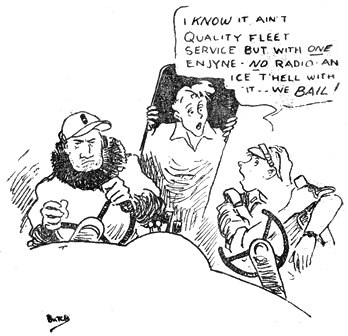 |

A Soldier Returns
Aboard the flagship "Missouri" this week was one soldier whose most cherished dreams were coming true.
He had as big a score to settle with the Japs as Gen. MacArthur. as big a score as most American soldiers who fought the Pacific war to its finish.
He was Lt. Gen. Jonathan M. Wainwright - "Skinny" Wainwright - the "GI general" who for three and one-half long, bitter,heart-breaking years, by his own heroic choice watched the war from the most hopeless positions on earth - as a Jap prisoner of war.
For three and a half years this man, who had fought do valiantly with so little, was helpless in the hands of the Japs.
But they were never really his conquerors.They could never dampen a spirit such as his.Even in the darkest hours Gen. Wainwright knew that those men who died on Corregidor had not died in vain.While the Jap militarists strutted proudly and boasted of their victories in the Pacific and in the Far East he knew that his old boss in Australia and themen under him would eventually be on the road back.He waited patiently, confidently, for that day.
It was faith in the American soldier that kept his spirit unbroken - faith in the GI who slogged through glutinous mud day after day.And there was never any doubt that those GIs would break that faith.They knew Gen. Wainwright, and the general knew them.
They knew that he had been given his chance to leave the Corregidor death trap.They knew that as long as there was one soldier struggling against the hopeless odds on that island the general wasn't going to leave.
Then came the fateful day Corregidor fell.The men in the little group threw themselves upon the mercy of the Japs.Their leader was there with them.
Now, three and a half years later, Gen. Wainwright has witnessed the surrender of his "conquerors."And at his insistence, a fellow soldier, an American sergeant, along with other prisoners, went with him.The general had said: "I'm especially anxious that they be present."
The man who went to prison with his men isn't leaving them now that he is out.For him it was a fateful moment when he watched the Japs acquiesce; and still thinking of his men, he knew it was just as fateful a moment for them.
So this week, the general and his men were back with their old boss.In Gen. Wainwright's own words, "the shoe was on the other foot."
|
Precious Cargo
ICD has flown cargoes of war materials vitally important to the outcome of the war, but its airplanes never have carried theprecious cargo they are carrying now - returning American prisoners of war.
Men - fighting men - who not only survived battle dangers, but months or years in Japanese concentration camps aftertheir capture, deserve the finest of everything their country, to which they have given so much, can give them.
In many instances, the first contact that many of these men will have with the army and with fellow American soldiersafter their release will be when ICD picks them up at assembly points and starts them to hospitals and then home.
It is up to everyone - pilot, crew member, P & T officer, personnel officer and every other man who has nothing to dowith speeding prisoners of war home - to extend every possible courtesy to them.
By courtesies we mean the little personal things - seeing that these returning soldiers are comfortable, that they havethe best transportation available, that there are no unnecessary delays anywhere along the line.
Such extra effort isn't a duty; it's a privilege.The army - flight surgeons, hospitals - will officially do everything in its means to take care of these men.But the little personal touches will mean a lot.
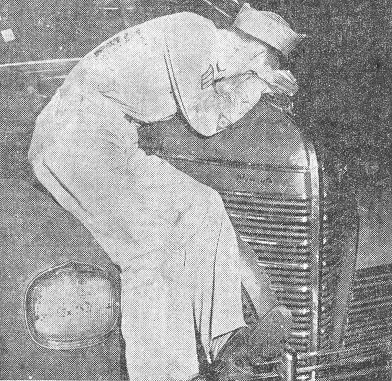 |
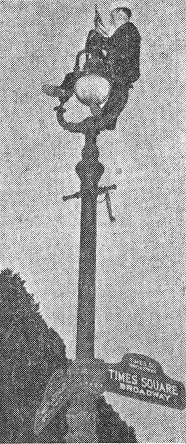 |
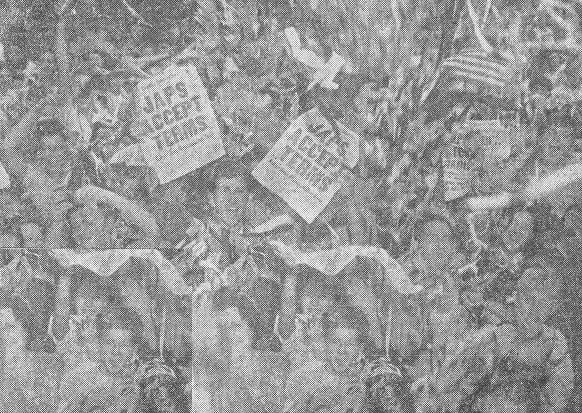 |
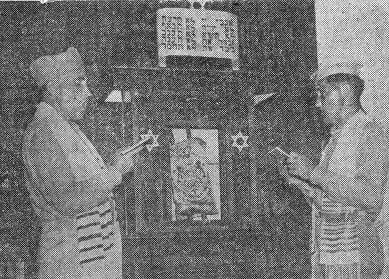 |
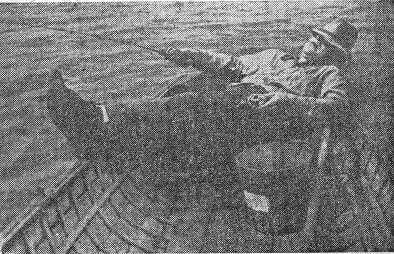 |
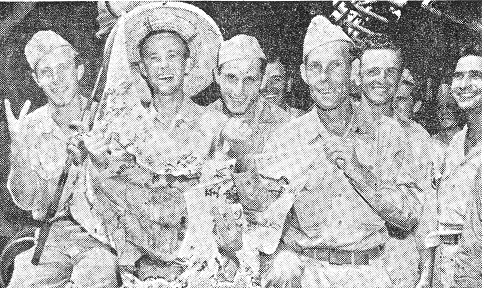 |
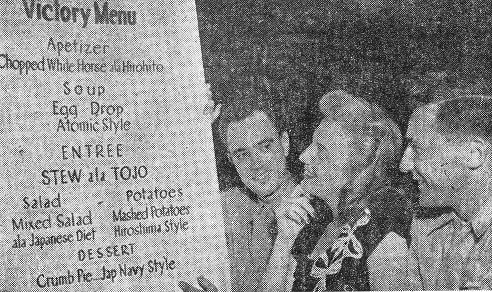 |
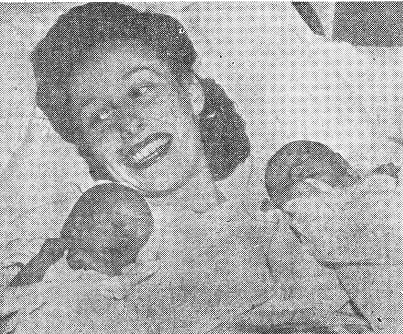 |
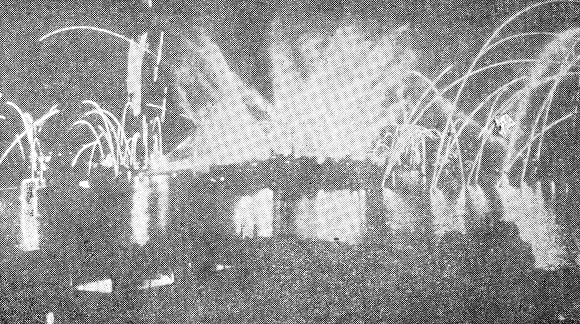 |
|
Who is this guy that said travel was broadening?He never traveled by bucket-seat.And it costs so much more to go first class in the air corps!
COMIN' HOME . . .
Silently the stream of people wend their way back down the hills yellow with pregnant rice.With them come their belongings or what is left of their belongings.Some carry them on their backs, others tote them on carrying-sticks that balance the large bundles across the shoulders,and others - the filthy rich - have packed their baggage on donkeys or junior-sized horses.
They are making their way to a little town that sits perched on the banks of a slow-moving, muddy river.Once this was a peaceful little town of culture, pipe dreams and porcelain factories.It was a fairly modern little place with electric lights (!), running water (!), underground sewerage systems (!) and neat houses.With war its population had swelled to nearly a million even though it was in the occupied zone called the Jap corridor.Children swam around the sampans and splashed the muddy water.People went about their business and life was good. Then came war.
Today the place is coming back from the dead.Houses that were once homes are now mere shells with burned-out guts and shaky walls that crumble to clutter sidewalks and streets.Shade trees that once cast their shadows into the cool of pleasant tea gardens are now just shattered things that weep their sap intopiles of rubble that crowd against their broken trunks.Here and there among the heaps of brick and break are bits of porcelain and splinters of chopsticks.
Clothing, food, housing, everything is scarce here except spirit.This town will live again.
HOSTEL RUSSO . . .
Back in 1939, before the little brown men ever thought about this town, the Chinese built an airstrip and living quartersfor the Russians who were to come down and train Chinese pilots.War came first, the Russians never.The airstrip, though still serviceable, is now tired with grass and weeds.
But the hostel is a thing of beauty.One of the few large buildings in the town which remains intact, it was built at a reputed cost of $6,000,000 gold.In some ways it looks it.
The three-story building is enclosed in a high-walled court.Green lawns and bowing shade trees dot the front yard and flowers run along the walks, lending a bit of gaiety to the surroundings.Large, stately pillars guard the entrance to the main foyer, holding high the gabled roof.
Inside everything is marble and heavy beams of both wood and sunlight.Halls run into more courtyards and fancy woodwork borders the door frames, window sills and ceilings with a bit of old China.It would make a perfect rest camp.
If a sign painter were to ponder on a greeting to be hung over the gate it should read... "Peace, it's wonderful."
LOSS OF FACE . . .
When the Japanese got ready to leave Chihkiang they climbed into the plane and prepared to start the engines.Guys crowded around to watch the big bird go.
First the pilot tried to start the right engine... no soap.Then he tried the left... same story.Two of the crew climbed out and started cranking; still no go.By this time the GIs were smiling and making slightly impolite remarks.
|
When the pilot reached out and dropped a screwdriver, they tittered.When, after trying to start the engines again with no success, he dropped a wrench to the men under the wing, the guys really laughed.Finally, two wrenches and a pair of pliers later, the engines sputtered to life and the ship waddled away to take off
Apparently when the Japs copied the Wright engine they left out one or two essential nuts and bolts.
World War Finds
Loot's 'Old Hoss'
Still His Friend
SOS Base, South China - The lieutenant stopped his jeep and whistled to the horse at the roadside.The horse looked up and raised his ears, recognizing the whistle of an old friend.
Lt. Edward G. Gallagher, Scranton, Pa., taught horseback riding in the U.S. and his favorite steed had been "Officers' Charger,"the strong, black horse he met again at the roadside, this time 13,000 miles from home.
Serving now with a Chinese Cavalry squadron, Officers' Charger came overseas several months after Lt. Gallagher.
Madame Chiang Returns
After Year in States
Hq., Calcutta - On her way home after almost a year in the U.S., Madame Chiang Kai-shek arrived in Calcutta Tuesday on an ATC C-54 and left Wednesday morning for Chungking.
Madame Chiang, who has been recuperating in Riverdale from a recent illness, had stated in the States that she was returningto China to "help her husband in his work."
The wife of the Generalissimo was met at Barrackpore by Gen. Tunner. Mr. C. P. Chen, consul-general for China, and other Chinese representatives were also present at the field to welcome Madame Chiang.She left immediately for Calcutta to rest before continuing her flight.
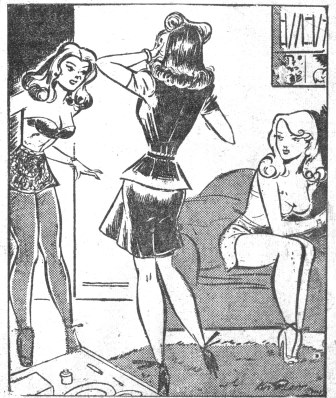 "He fell for your pin-up pictures - but how d'ya know he'll like you in clothes?" "He fell for your pin-up pictures - but how d'ya know he'll like you in clothes?" |
Asks for United China
Chungking (ANS) - Generalissimo Chiang Kai-shek called on China's millions to crown their victory over Japan by buildinga new united China as "a model democratic state in the Far East."In his V-J Day message, Chiang said, "We shall brook no further delay in inauguration of constitutional democracy."Equal legal status was promised for all parties, but Chiang ruled out private armies.
At Last Discovers
What His Li'l Gal
Has Co-ordinated
1307 BU, New Delhi - Release of information about the atomic bomb was the key to another secret for Sgt. William Crumpton,navigation and briefing clerk here.
For almost a year Sgt. Crumpton has been wondering what kind of work his wife was doing at the big factory on the outskirtsof Knoxville.
It took Pres. Truman's announcement that the powerful explosive was being manufactured at Knoxsville for Sgt. Crumpton todiscover his wife's work - helping to manufacture the atomic bomb.
HUMP EXPRESS is the official newspaper of the India-China Division, Air Transport Command, APO 192, c/o Postmaster, New York, N.Y., and is published by its Public Relations office. Camp Newspaper Service and Army Newspaper Servicefeatures are used, reproduction of which is prohibited without permission of CNS and ANS, 205 East 42nd St., New York, 17, N.Y. Other material is submitted by staff members, ICD-ATC base Public Relations sections and other soldier correspondents. Printed weekly by the Hindusthan Standard, 3 Burman St., Calcutta, India, and distributed each Thursday. Passed by U.S. Press Censor for mailing.
| Military transport schedules over India for cargo, personnel and mail . . . maximum tonnage of essential war materials over the Hump . . . movement of troops and supplies in support of tactical operations in China . . . evacuation of the sick and wounded - these are the missions of ICD-ATC. |

SEPTEMBER 6, 1945
Copyright © 2015 Carl Warren Weidenburner
TOP OF PAGE PRINT THIS PAGE ABOUT THIS PAGE E-MAIL YOUR COMMENTS
PREVIOUS ISSUE HUMP EXPRESS BASE NEXT ISSUE
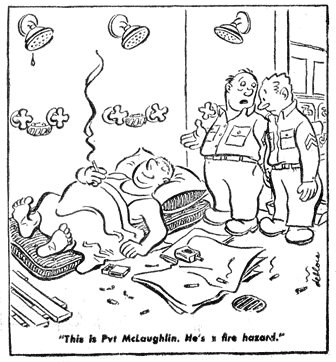
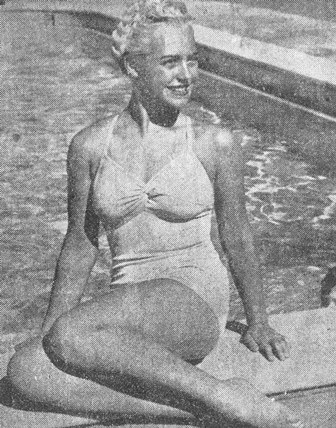 It doesn't seem possible, but the press agent insists this is 14-year-old Anita Lhoest, youngest champion to enter the National AAUsenior women's swimming and diving championships in Los Angeles.The PA lists her as "one of the most spectacular of the younger western swimmers."The cheesecake editor, who out-talked the sports ed for the photo, concurs.
It doesn't seem possible, but the press agent insists this is 14-year-old Anita Lhoest, youngest champion to enter the National AAUsenior women's swimming and diving championships in Los Angeles.The PA lists her as "one of the most spectacular of the younger western swimmers."The cheesecake editor, who out-talked the sports ed for the photo, concurs.